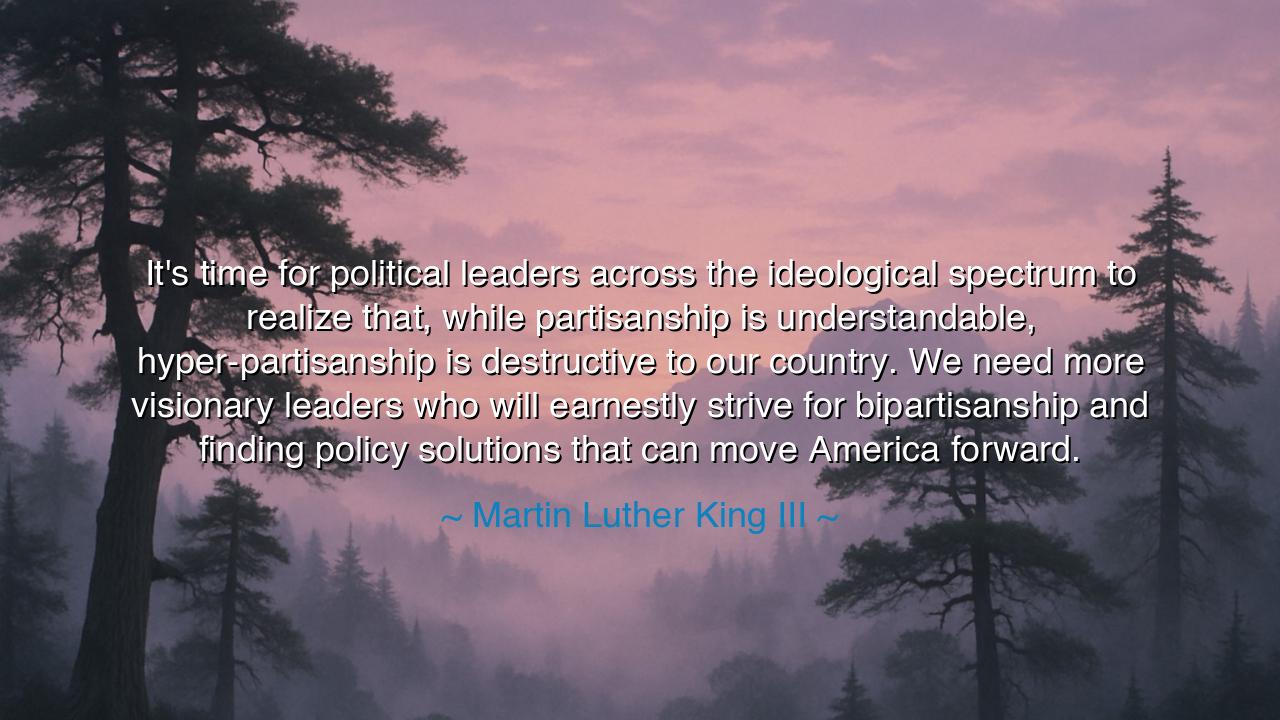
It's time for political leaders across the ideological spectrum
It's time for political leaders across the ideological spectrum to realize that, while partisanship is understandable, hyper-partisanship is destructive to our country. We need more visionary leaders who will earnestly strive for bipartisanship and finding policy solutions that can move America forward.






Martin Luther King III, heir to a mighty legacy, has spoken with the voice of wisdom: “It’s time for political leaders across the ideological spectrum to realize that, while partisanship is understandable, hyper-partisanship is destructive to our country. We need more visionary leaders who will earnestly strive for bipartisanship and finding policy solutions that can move America forward.” These words are not idle counsel but a cry from the heart of democracy itself. They remind us that the clash of ideas may be natural, but when discord hardens into hatred and division, it becomes poison, corroding the very foundations of a nation.
The meaning of this teaching lies in the distinction between partisanship and hyper-partisanship. Partisanship—the devotion to one’s cause, one’s principles, one’s vision—is not inherently evil; indeed, it is the fire of conviction. But when this fire grows uncontrolled, it ceases to warm and begins to burn. Hyper-partisanship blinds the eyes and deafens the ears, until men no longer see the truth in their rivals nor hear the cries of the people they are called to serve. It becomes a war of tribes rather than a government of citizens.
King’s words emerge from the long struggle of his father, Martin Luther King Jr., who taught that the destiny of America could not be fulfilled until black and white, rich and poor, stood together in justice. His father understood that the chains of injustice were strengthened whenever groups allowed hatred to divide them. In the same spirit, Martin Luther King III warns us that democracy cannot endure if leaders prize party victory above the common good. For the nation is not the possession of one faction—it is the shared inheritance of all.
History provides us with luminous examples of the power of bipartisanship. Recall Abraham Lincoln, who, in the midst of civil war, assembled a “team of rivals” in his cabinet—men from different parties, even those who once opposed him. Lincoln knew that only by harnessing the talents and perspectives of many could the Union be preserved. Or remember the days after World War II, when leaders from both sides of the aisle labored together to enact the Marshall Plan, rebuilding Europe and securing peace. These victories were not born of uniformity, but of unity—men willing to disagree, yet determined to work for something greater than themselves.
The lesson is sharp: when leaders cling to hyper-partisanship, they serve their faction but betray their country. When they embrace visionary leadership, they strengthen not only their own cause but the future of the nation. The true statesman is not he who wins every battle for his side, but he who lays down his pride to lift up his people.
For us who are not kings or lawmakers, the teaching still applies. In our workplaces, our families, our communities, division thrives when we cling too fiercely to our own view. But when we practice listening, when we honor the humanity of those who differ from us, we make space for solutions that transcend quarrels. Just as leaders must learn to govern with humility, so must ordinary citizens learn to speak, argue, and live with a spirit of common purpose.
So take practical wisdom from this cry. When you find yourself in conflict, resist the temptation to scorch the earth with anger. Seek instead the shared ground, however narrow it may seem. Honor conviction, but temper it with compassion. Demand of your leaders not only passion but vision, not only victory but unity. For in unity lies the strength of nations, and in division lies their fall.
Thus the words of Martin Luther King III must be remembered as both warning and promise. Partisanship may be understandable, but hyper-partisanship is ruinous. Bipartisanship is not weakness, but strength; not surrender, but wisdom. Let future generations say of us that in the hour of division, we chose to heal. Let them say we demanded leaders who carried not only the banner of their party, but the torch of the people. For only then shall America truly move forward.






AAdministratorAdministrator
Welcome, honored guests. Please leave a comment, we will respond soon